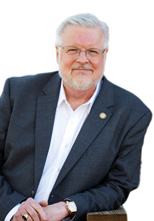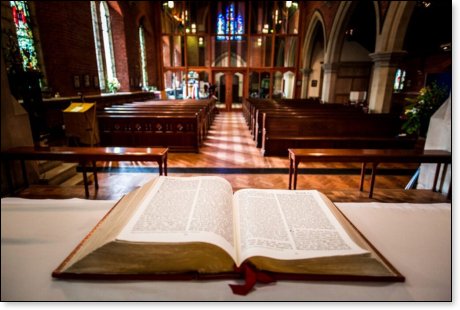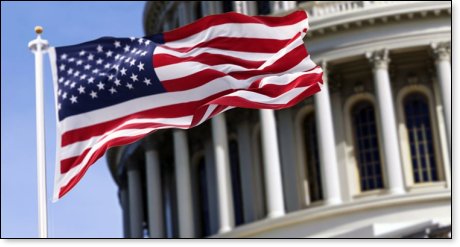
Rev. Mark H. Creech

Loran Livingston, the esteemed pastor of Central Church in Charlotte, North Carolina, recently garnered national attention for his bold sermon critiquing the “God Bless the USA Bible,” endorsed by former President Donald Trump.
Although I haven’t had the privilege of meeting Pastor Livingston in person, I’ve been blessed by snippets of his sermons shared on social media. His preaching resonates with a rare fire and passion seldom encountered in today’s pulpit. In an era where such fervor for the Word of God is increasingly scarce, Pastor Livingston stands out as a modern-day John the Baptist, a figure to be esteemed and honored among the saints. From what I’ve seen of his ministry, it appears to be rooted in an unwavering faithfulness—a quality deserving of recognition and appreciation.
Livingston’s impassioned remarks, which have gone viral, have prompted much broader concerns than just the questionable legitimacy of a Bible containing various American documents like the U.S. Constitution. His words reflect the profound interest by many about the role of Christianity in not only shaping one’s personal beliefs but also societal values. Christians are challenged to explore the complexities of religious identity, their citizenship responsibilities, and the relationship between faith and public life.
In script font below are Pastor Livingston’s assertions which captivated a wide array of people – Trump supporters, Trump opponents, Christians, non-Christians, believers, skeptics, conservatives, liberals, and individuals from all walks of life:
“Some of you bring politics into the church. You think that politics is spiritual stuff. Politics is of this world! You think it’s your duty to be political about this, that, and the other. No! Your duty is to serve the Lord your God with all your heart, mind, soul, body, and strength and love your neighbor as yourself.
“Don’t be talking to me about my spiritual responsibility to vote. I don’t have a spiritual responsibility to vote. I have a civic privilege. Don’t be telling me that voting is spiritual.
“See that’s what happens when you don’t read and pray. When you don’t read and pray, you say, “Wow! There’s a Bible out now that includes the Constitution and the Bill of Rights. Isn’t that wonderful?”
“No, no, it’s disgusting. It’s blasphemous! It’s a ploy! Are you kidding me? Some of you are so encouraged by that. Let me tell you something. The Gospel is not an American Gospel. It is the Gospel of the Lord Jesus Christ!

“But pastor I bought the Bible. Really? You’re telling me that you’re encouraged because someone took a government, U.S. Constitution, a document that says, ‘We are of the people, by the people, and for the people – the people – the people – the people – and you have put it right beside the Word of God, which is eternal, unchanging, which says of Him – by Him – through Him – to Him – and from Him are all things – and you’re going to put those together and be happy about it. God forbid!
“Now, you can get mad if you want to but I’m going to tell you something. If you glory in that kind of thing, you don’t have a prayer life. If you glory in that kind of mess – political mess – you do not know what the Word of God says.
“I’m going to rare back and tell you something. This is not my home. This world is not my home. I’ve been sent out just like the 70 were sent out. You’ve been put here just like the 70 were sent out. We’ve been put here as strangers, and pilgrims, and we are passing through. I am just walking through. I’m just renting an apartment for a little while in this strange and foreign land. No sir, my real citizenship is in heaven, for which we look for the Lord Jesus Christ!”
-Pastor Loran Livingston
Central Church, Charlotte, North Carolina
While Pastor Livingston’s fervor for maintaining the purity of spiritual devotion is commendable, the Bible makes no stark line of demarcation between the world of politics, and one’s duty to “serve the Lord your God with all your heart, mind, soul, body, and strength, and to love your neighbor as yourself.” The Bible’s teaching on faith and civic responsibility is considerably more nuanced than Pastor Livingston’s stance.
A compelling approach to understanding Scripture’s guidance on this subject is to examine the life of Jesus. Can we discern elements of political engagement in the teachings and actions of our Lord?
Without question, Jesus’ ministry was not about establishing a political kingdom. He stated clearly, “My Kingdom is not an earthly kingdom. If it were, my followers would fight to keep me from being handed over to the Jewish leaders. But my Kingdom is not of this world” (John 18:36).
However, as the “Theology of Work Bible Commentary” notes: “It is equally important to understand what Jesus is not proclaiming. He is not saying that His kingdom is an ephemeral, internal religious experience that does not impinge on economic, political, or social issues in the real world.” [1] On the contrary, when politics stray from a genuine grasp of Jesus’ teachings, they run the risk of gross misdirection, and at worst, peril.
While the primary emphasis of Christ’s ministry undoubtedly lies in spiritual regeneration — the salvation of souls — its implications are far-reaching. When embraced and applied to all facets of life as intended by Him, the transformative impact knows no bounds, bringing redemption to every sphere it touches. Although Christ’s kingdom surpasses earthly realms, its intended influence extends beyond the individual soul to permeate and enrich society as a whole.

Consider the political connotations of what Jesus said in his famous Sermon on the Mount. Although there are many broader societal meanings behind what Jesus was saying throughout this incomparable sermon, word space limitation necessarily constrains us to take up only two.
Jesus declared, “Blessed are those who mourn, for they will be comforted” (Matthew 5:4). The esteemed Bible scholar, James Montgomery Boice, who served as senior pastor of the historic Tenth Presbyterian Church in Philadelphia, has expounded on the essence of Christ’s message in this passage. In his commentary on the Sermon on the Mount, Boice emphasizes that while the core of Christ’s words pertains to a sinner mourning over his transgressions against God, they also encompass the wider call to social engagement.
Boice rightly asserts this text is also “a call to involvement in the social arena — in the struggle of blacks for true equality, the plight of underpaid workers, pollution of our natural resources, education, ethical problems in politics, medicine, and business, and other contemporary problems — just as Christians were formerly active in the war against slavery, child labor, lack of freedom of the press, and immorality. We should mourn for such things. And we should mourn deeply enough to do something about them.” [2]
In the Sermon on the Mount, Jesus instructed his followers to embody the roles of “salt” and “light” (Matthew 5:13, 14). During Jesus’ day, “salt” served as a preservative, preventing decay in food, while “light” symbolized dispelling darkness.
John R.W. Stott, the former rector of All Souls Church in London, rightly interprets this passage, noting that salt primarily acts negatively by halting decay, whereas light functions positively by illuminating the darkness.
Therefore, Jesus calls his disciples to exert this kind of influence: restraining decay through their actions and bringing illumination to darkness.
“Jesus calls his disciples to exert a double influence on the secular community, a negative influence by arresting its decay and a positive influence by bringing light into darkness,” says Stott. “For it is one thing to stop the spread of evil; it is another to promote the spread of truth, beauty, and goodness. Putting the two metaphors together, it seems legitimate to discern in them the proper relationship between evangelism and social action in the total mission of Christ in the world – a relation which perplexes many believers today.” [3]
Moreover, it’s crucial to remember that Jesus didn’t hesitate to harshly address both the religious and secular authorities of his time.
In Matthew 23:15, he sharply rebuked the religious leaders, denouncing their hypocrisy and exploitation of converts. Similarly, he displayed righteous indignation when driving out the moneychangers from the Temple, citing their desecration of a sacred space (Mark 11:15-17). While many perceive his actions to be primarily about spiritual matters, they also carried with them political implications and consequences that would lead to Christ’s crucifixion.
 Christ spoke truth to power. He referred to Herod as a “fox,” which highlighted our Lord’s discernment and boldness in confronting political figures (Luke 13:32). When Pilate asserted his power over Jesus, saying, “Why don’t you talk to me? Don’t you realize that I have the power to release you or crucify you?” (John 19:10). Jesus replied, “You would have no power over me at all unless it were given to you from above” (John 19:11). This audacious statement by Christ to Pilate put the potentate in his place, declaring in no uncertain terms his authority was derived from God, and any authority Pilate possessed was granted to him by divine providence.
Christ spoke truth to power. He referred to Herod as a “fox,” which highlighted our Lord’s discernment and boldness in confronting political figures (Luke 13:32). When Pilate asserted his power over Jesus, saying, “Why don’t you talk to me? Don’t you realize that I have the power to release you or crucify you?” (John 19:10). Jesus replied, “You would have no power over me at all unless it were given to you from above” (John 19:11). This audacious statement by Christ to Pilate put the potentate in his place, declaring in no uncertain terms his authority was derived from God, and any authority Pilate possessed was granted to him by divine providence.
Those who fail to recognize Jesus’ ministry had spiritual and political significance are overlooking the comprehensive impact God intends for us to see in His Word.
Was Jesus political? The core of Jesus’ message indeed revolved around matters of faith and spirituality. But it’s important to acknowledge that our Lord’s teachings and actions were meant to have an effect on the sacred and the secular because he is rightfully sovereign of everything.
Our primary allegiance should indeed be to God and His kingdom, but the Scriptures also calls upon believers to engage responsibly in the societies they live. This includes participating in the political process (Romans 13:1-7), which can strategically influence positively the well-being of communities, allowing believers to advocate for that which is most noble and beneficial.
Pastor Livingston is correct to point out that the Christian’s citizenship is in heaven (Philippians 3:20), but this doesn’t negate our responsibilities as citizens of earthly cities, states, and nations. Just as the apostle Paul leveraged his Roman citizenship to advocate for his rights, Christians should utilize their “civic privilege,” including voting, to contribute to the common good and uphold moral values that are fundamentally necessary for human flourishing.
To argue these matters are not similarly a “spiritual duty,” is an untenable contention in light of the apostle Paul’s admonition: “So whether you eat or drink, or whatever you do, do it all for the glory of God” (I Corinthians 10:31).
Again, there is no separation between “spiritual duty” and “civic privilege.” Rather than compartmentalizing spirituality and civic responsibilities, Christians should approach politics as an extension of their faith, carefully measuring social and political issues by the Scriptures.
This does not mean equating the U.S. Constitution with Scripture, nor is it saying the Gospel is “an American Gospel.” Instead, it’s simply stating that God’s Word can and should inform our perspectives on governing and policy-making.

Pastor Livingston is also right to caution against idolizing political systems and figures. They are not our hope. Our confidence should be in the Lord. Nevertheless, Christians are called to engage affairs of state with wisdom and discernment (Colossians 4:5-6). This involves prayerful consideration of candidates for office and proposed public policy initiatives, aligning them, as much as possible, with the values that mirror God’s heart for justice, mercy, compassion, and righteousness.
And, rather than viewing politics as a “mess,” Christians should see it as a realm where God’s transformative power can be manifested. Through active godly involvement, believers can influence policies and institutions toward greater conformity to Christ’s kingdom values.
If you should doubt whether this ever happens, let me tell you from years of personal experience as a minister of the Gospel of Christ and a lobbyist for the Christian Action League of North Carolina (a total of 44 years of ministry), if it weren’t for such people and their influence already in high places, this nation would currently be in hell.
Wayne Grudem, in his amazing book, “Politics According to the Bible,” succinctly summarizes what’s been said:
“Forgiveness of sins is not the only message of the Gospel. That is because Jesus is looking for transformed lives and through them a transformed world. “The reason the Son of God appeared was to destroy the works of the devil” (I John 3:8). The good news of the Gospel will result in changed lives, but Jesus wants that to result in changed families as well. And when the Gospel changes lives, it should also result in changed neighborhoods. And changed schools. And changed businesses. And changed societies. So, shouldn’t the Gospel also result in changed governments as well? Of course, it should!” [4]
Still, how is this going to take place if Christians are disengaged from politics?
I submit a chief reason for our nation’s moral and civil free-fall, which includes serious deficits in transparency and accountability in government, excessive bureaucracy hindering efficiency, corruption and unethical practices, partisan gridlock and polarizations, injustice in policy outcomes, failure to address urgent matters of national security, erosion of religious liberties, ineffective use of taxpayer monies, etc., is because God’s people, individuals of upstanding Christian character, persons of faith who know their Bible, have erroneously extricated themselves from the process. Thus, wicked people have filled the vacuum and are now legislating their immorality.
No, with the deepest respect, I cannot agree with Pastor Livingston’s view. It reflects a limited understanding of the mission of God’s kingdom and the expansive nature of our Lord’s redemption message.
To paraphrase a statement once made by Sir Frederick Catherwood: To try to improve politics is not worldliness but love. To wash your hands of politics is not love but worldliness.
Resources:
[1] “Theology of Work Bible Commentary,” accessed online at https://www.theologyofwork.org/new-testament/john/
[2] James Montgomery Boice, The Sermon on the Mount: Matthew 5-7 (Grand Rapids, MI: Baker Books, 2002), 28.
[3] John R. W. Stott, Christian Counter-Culture (Downers Grove, IL: InterVarsity Press, 1978), 64-65.
[4] Wayne Grudem, Politics According to the Bible (Grand Rapids, MI: Zondervan, 2010), 47
© Rev. Mark H. CreechThe views expressed by RenewAmerica columnists are their own and do not necessarily reflect the position of RenewAmerica or its affiliates.


















